What This Teacher Wants Parents to Know
I survived my first blogging experience, and I’ll be honest, I’ve found it somewhat meditating to write out what’s swirling around in my head. Now I know how my students feel in Ms. Barnes’ class!
Over the past couple of years as a teacher at RCA, my current events class has been anchored by CNN Student News, hosted by Carl Azuz, who has become a friend of the school. This morning he published an article looking at Things Teachers Want Parents to Know. Similarly, Ron published an article last year looking at What Teachers Really Want to Tell Parents. Both stirred up emotions and feedback from readers because education is one aspect of society that everyone has an opinion on. As my friend Kim Bearden says, “Everyone is an expert on education because they went to school.”
While I am intrigued by these articles and think that they are excellent discussion starters, I want to approach the issue of parents from a different perspective. I am going to say thank you to my parents over the years. In nine years (about 700+ families), I have had some of the most amazing parents support me in my classrooms that have spanned five schools, three cities, suburban and inner-city, and elementary to middle school. They supported me with some crazy assignments, fundraisers, and requests, but I think in the end it brought me closer with the families and made me a better teacher.
Now, I have certainly been blasted over email, in conferences, and even once in Chik-fil-A (that’s a long story), but I have never ended the school year on a bad note with any family from my perspective. In fact, I can only think of two parents that I had to have an administrator sit in on the conference with me for, and both smoothed over quickly. Maybe it’s luck? I’m not sure, but I feel that I have established a few routines that have helped me over the years with parent relationships.
1) Quick responses: I treat emails and phone calls like the business world where there is a 24 hour expected turnaround. I try to respond to questions or concerns quickly so they do not linger in my inbox. If it is an angry email, I will give it a little bit longer so the heat can settle a bit, but there’s no reason it should not be answered in a timely manner. I simply look at it as good customer service. In return, I often find parents will respond to me quicker as well when I email them.
2) Show some love: When I see a parent, I try my best to go up to them and at least say hi, if not have a conversation. This is not always easy when a thousand things are going on, but it builds trust and means a lot. In the end, you end up learning a lot more about each other and find out pertinent information about the child that you would have otherwise not have known.
3) Put yourself out there: I have been the “new” teacher several times since I have taught at a number of schools over the years, and I have learned that you need to make an impression to set the tone for yourself. The parents and kids are curious as to who you are and what type of teacher you will be, so I have taken the approach to taking part in as many activities, school functions, and opportunities that arise so they see me as more than the guy teaching in the classroom. This may include school fairs, fundraisers, family nights, sports games, etc. It means a lot when parents see you outside of the classroom.
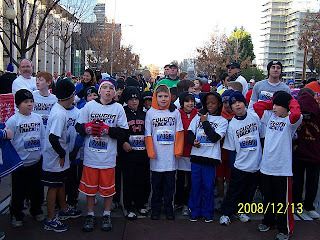
|
| The Endhaven Elementary Running Team participates in a 5K |
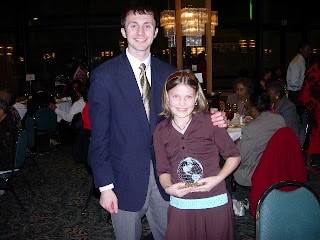
|
| With Hannah at an award’s banquet from several years ago |
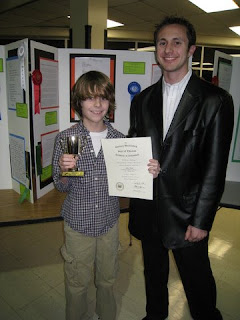
|
| With Jake at a writing award contest |

|
| With Jacob at the Wake vs. NC State game. |
 |
| Gina and I went to the Pryor’s house to help celebrate Brandon’s football championship |
4) Involve the parents: This is not always easy at schools where parent involvement struggles, but it is possible! A quick story from when I was in an inner-city school in Charlotte. I had done a cultural unit for several years prior to this one at schools with heavy parental involvement. The unit culminated in a cookout, where students brought in foods from their background and shared their projects that they had worked on throughout the unit with the parents. It was always a lot of fun and I had tons of parents show up. This school struggled with parental involvement, so I was not sure if it was going to work. I decided to do it anyway, and while I did not have a ton of parents there, I had a handful that came and took time off work to help celebrate their child’s hard work. They appreciated being invited to school for a positive experience with their child, not to mention some good food! The lesson here is to provide the reason for parents to get involved and provide a positive experience when they’re there.
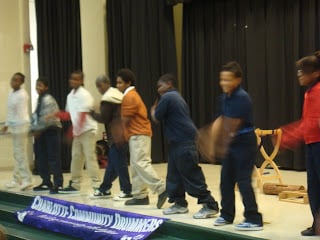
|
| Here is a picture from that day. I asked a community drumming group to come as well, so the kids got to play drums. |
5) Have fun: This means more than anything else to me because if you can’t have fun, how can you expect the students and parents to enjoy the school year? I tell people in my workshop I lost my shame a long time ago, so it’s all about making the educational experience as valuable as possible at this point. This may involve some humiliating situations, but in the end, I see it as a good cause. Personally, I have enjoyed the use of some costumes over the years to have some fun. Check out some classics:
Overall, I have learned that a successful classroom involves the partnership between the teacher and parent. The two parties are not always going to agree on every decision, but as long as the teacher and parent find ways to do what’s best for the child, that is what will make him or her most successful.
So to my former parents who may read this, thank you! You helped me be successful!




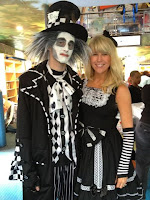

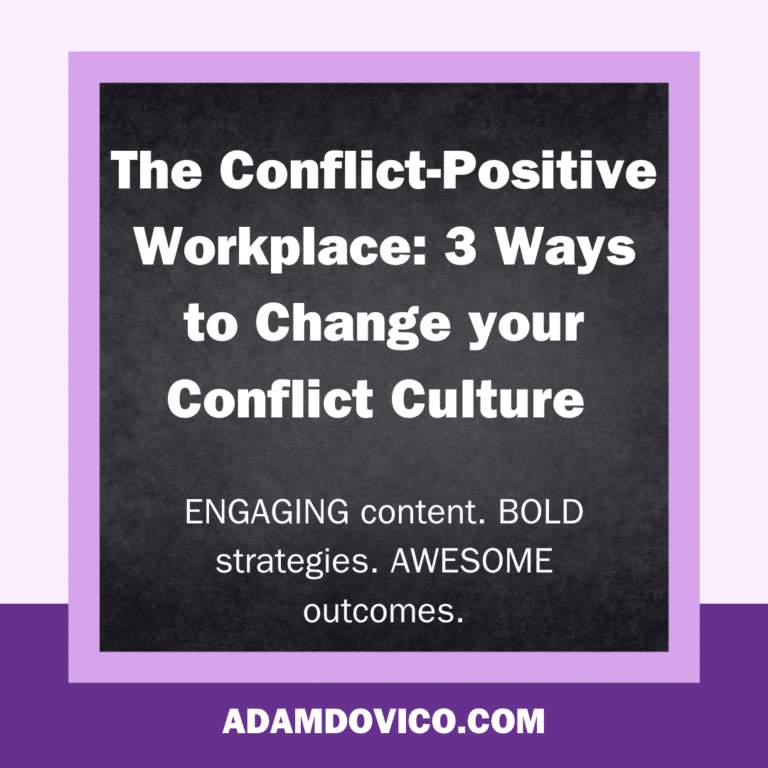

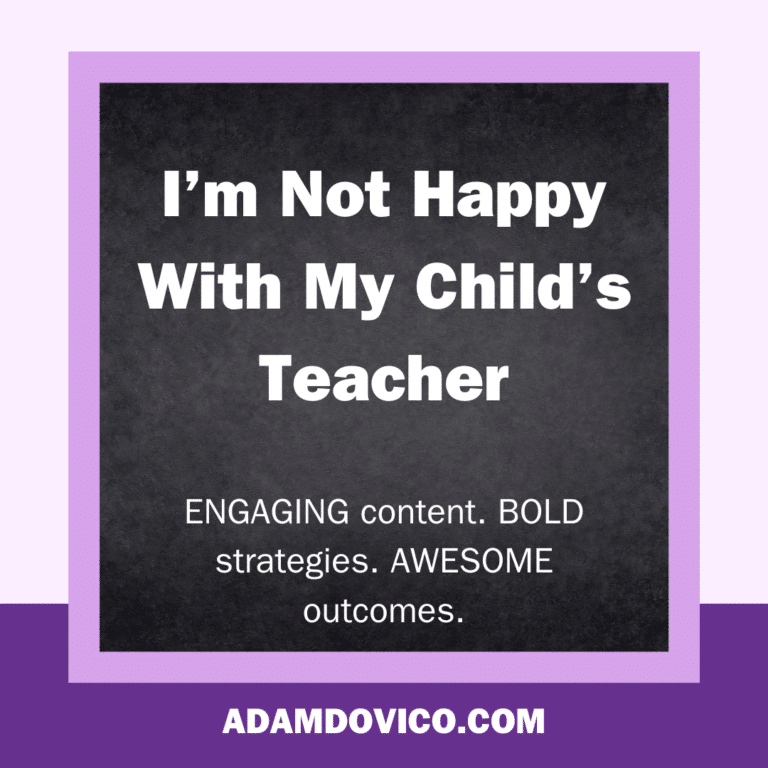


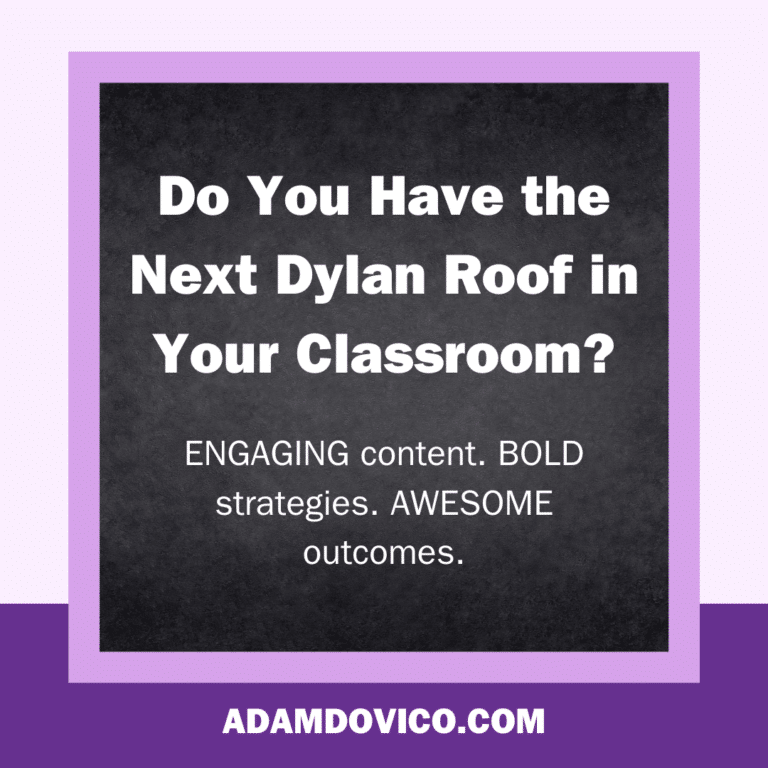

Great photos. I do "dress-up" in my own clsssroom.
– Greg
I love the Elvis suit!